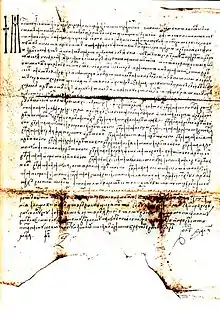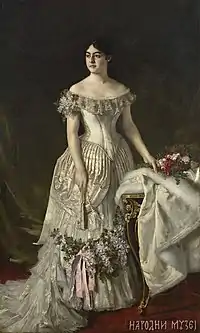Keșco
Keșco (Russian: Кешко), (English: Keshko) or Keșcu/Cheșcu, was the name of an ancient Moldavian Boyar noble family.[1]

History
According to Johann Svoboda, the family had its roots in Russia, where members of the family appeared in 1097 as Knyazen in the Principality of Kiev. According to him, the family has descended from Rurik dynasty, in particular from the Wassilko, Prince of Rostov (1209–1238).
In Moldavia
Historically, the family was established even before the Principality of Moldova was founded in 1350. They owned the forest on the left bank of the Sereth river, Panka region, Mihondra river valley and founded Lucavăţ village, which was all owned by Luca, member of the family. The family is said to be, along with the House of Dragoș, the oldest in this region. Luca's sons Stan and Șerbco were knights at the court of Prince Alexander I of Moldavia. He officially confirmed their family possessions of Lucavăţ, Panka with Mihodra to them with hereditary rights for their descendants by the document of February 16, 1428.
The church of Lucavăţ became first seat of Bishopric of Rădăuți, with its pastor, by proclamation of Prince Stephen the Great of Moldavia became its first Bishop on March 15, 1490. Prince Alexandru Lăpușneanu of Moldavia, grandson of Prince Alexander "the Good", not only confirmed the legality of the certificate issued by his grandfather on May 7, 1565, but also subsequently transferred to the family the co-ownership of a large number of villages in northern Moldova which expanded the land they owned. Later, during 17th century, brothers Vasile, Nicolae and Constantin Căzăcescul were again officially confirmed ownership of all their expanded possessions by Prince Illias III of Moldavia on March 12, 1667.
Wassilko von Serecki
Vasile (Basilius) Căzăcescul (1631–1701), the eldest of the above mentioned brothers, married in 1654 Candachia Cocoranul (1635–1688), the daughter of the Boyar Isac Cocoranul. He was, as historian Teodor Bălan wrote, the ancestor of the Counts Wassilko von Serecki.
Keshko family name
It was first mentioned as such in the 17th century.[1] Constantin Căzăcescul, younger brother of the above mentioned Vasile (Basilius) (1631–1701) and Nicolae, got confirmed in 1667 his noble status and his possessions in the Principality of Moldova by ruling Prince Illias III. His descendants kept using his nickname as family name, making him an ancestor of the Keshko (Keșco/Keșcu/Cheșcu) family, which in turn made them collateral branch of Counts Wassilko von Serecki, who were later one of the largest landowners in Austro-Hungarian Empire. It was the only family of ethnic Romanian origin to acquire the title of Count throughout the Empire.
In the Russian Empire
Members of the Keshko family served the Russian Empire.[1] As such they held the title of Marshals of Nobility of the Bessarabia Governorate (1812–1917) where they held large properties. Throughout the years they were also incorporated into the Russian nobility, apart from already belonging to Romanian and Moldavian nobility.
Family tree
- Constantin Căzăcescul, whose descendants adopted and used Keșco version of his nickname as their official surname, married Irina Ianni
- Gheorghe Keșco
- Peter Keșco (died in 1790), married Balasa Vârnav
- Ioanita Keșco (died in 1817), married Tsaritsa Costache (Costaki) (born in 1785), daughter of Manolache Costaki and Princess Ileana Rosetti
- Ioan Keșco, (1809–1863), Russian Marshal of Nobility in Bessarabia, married firstly Romanian noblewoman Natalia Balș (1812–1830), daughter of Iordache Balș, Grand treasurer of Moldova and Princess Ruxandra Sturdza (1785–1844), married secondly Zamfira Kalmutki, daughter of Gheorghe Kalmutki
- Petre Keșco (1830–1865), Colonel in Russian Imperial Army, married his cousin Princess Pulcheria Sturdza of Moldavia (1831–1874)
- Natalie Keșco, Queen consort of Serbia (1859–1941) married her second cousin, King Milan I of Serbia.
- Ioana Ecaterina Keșco (1860-1934), who married on 5 February 1883 her relative Prince Eugen Ghica-Comănești (1840–1912).
- Maria Keșco (1861–1935), who married on 13 April 1886 Prince Grigor Ghica-Brigadier (1847–1913).
- Ioniță (Ioann) Keșco (died in 1877), only brother; he was the fourth and last child.
- Viktoria Keșco (1835-1856), married Bessarabian nobleman of Greek descent Alexander Dimitrievich Inglezi (1826-1903), son of Dimitri Spiridonovich Inglezi (1771-1846).
- Petre Keșco (1830–1865), Colonel in Russian Imperial Army, married his cousin Princess Pulcheria Sturdza of Moldavia (1831–1874)
- Viktoria Keșco (born in 1802), who married Belorussian nobleman Felix Wakar, Korwin Coat of Arms (1792-1865).
- Gheorghe Keșco (born in 1813)
- Ioan Keșco, (1809–1863), Russian Marshal of Nobility in Bessarabia, married firstly Romanian noblewoman Natalia Balș (1812–1830), daughter of Iordache Balș, Grand treasurer of Moldova and Princess Ruxandra Sturdza (1785–1844), married secondly Zamfira Kalmutki, daughter of Gheorghe Kalmutki
- Mihalche
- Ioanita Keșco (died in 1817), married Tsaritsa Costache (Costaki) (born in 1785), daughter of Manolache Costaki and Princess Ileana Rosetti
- Peter Keșco (died in 1790), married Balasa Vârnav
- Mihail Keșco (died in 1727)
- Gheorghe Keșco
House in Chișinău
 Keshko House in Kishinev
Keshko House in Kishinev
Family members
 Portrait Natalie Keshko, Queen of Serbia, currently displayed in National Museum of Serbia
Portrait Natalie Keshko, Queen of Serbia, currently displayed in National Museum of Serbia Another portrait of Queen Natalie by painter Vlaho Bukovac
Another portrait of Queen Natalie by painter Vlaho Bukovac Bust of Queen Natalie by Hungarian sculptor and artist Alajos Stróbl
Bust of Queen Natalie by Hungarian sculptor and artist Alajos Stróbl
References
- Lecca & Caragiale 2000, p. 353.
Sources
- Octav-George Lecca; Mateiu I. Caragiale (2000) [1899]. Familiile boierești române: istorie și genealogie : după izvoare autentice. Libra. ISBN 978-973-99914-4-5.